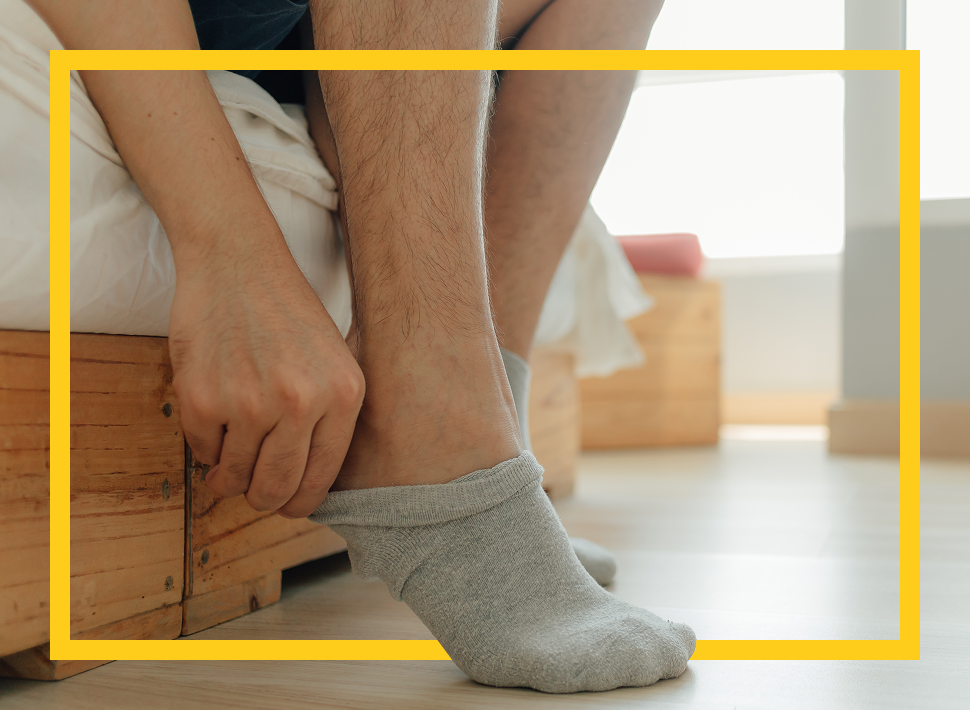Sweaty feet are an everyday problem for many people – often accompanied by an odor, damp socks and an unpleasant feeling in your shoes. But when is sweating still normal – and when is there more to it and could perhaps indicate an illness? In this article, you will find out what really helps against sweaty feet, what the possible causes are and when a medical examination is advisable.
Sweaty feet – a normal phenomenon?
The soles of our feet are one of the sweatiest parts of our body: Over 250,000 sweat glands regulate the temperature here and protect the skin from overheating and friction.
Slightly damp feet after sport, hiking or in high temperatures are therefore completely normal. It becomes problematic when sweating is persistently heavy – regardless of external factors.
Then it’s worth taking a closer look at the possible causes of sweaty feet.
Causes of excessive foot sweating
If sweaty feet occur regularly – regardless of heat or exercise – there may be various triggers behind it:
- External factors: Tight, non-breathable shoes, synthetic socks or warm climate
- Physical causes: Hormonal changes, overweight, metabolic disorders
- Psychological triggers: stress, anxiety or nervousness – so-called psychogenic hyperhidrosis
The psyche plays a bigger role than many people realize, especially in everyday life. People who are under pressure to perform or feel socially insecure often sweat more – even on their feet.
The causes of sweaty feet are therefore varied – and not always obvious.
Pathological form: Hyperhidrosis on the feet
If sweaty feet persistently occur – regardless of heat, movement or footwear – hyperhidrosis may be present. This is a pathological disorder of sweat regulation that should be treated by a doctor.
Typical are:
- Permanently damp or wet soles of the feet, even at rest
- Cold, sweaty feet, especially in stressful or emotionally stressful situations
- Accompanying problems such as skin irritation, odor or fungal infections
Anyone who notices such symptoms should seek medical advice – to clarify the cause and take targeted action against the pathologically sweating feet.
What to do about sweaty feet? Practical tips
There are a number of ways to alleviate the symptoms of sweaty feet :
- Daily foot hygiene: washing with mild, pH-neutral washing gel, thorough drying – especially between the toes
- Breathable socks and shoes: cotton, wool or special functional fibers; airy shoes or barefoot phases, if possible
- Foot powder or deodorants: Special products can bind sweat and prevent odor
- Foot baths with sage or oak bark: these home remedies have a slightly astringent and regulating effect on the sweat glands
Spirularin® F foot spray – care for sweaty feet
Spirularin® F foot spray was specially developed for people whose feet tend to sweat, smell or irritate the skin. It combines skin-caring properties with effective protection against germs:
- The microalgae active ingredient Spiralin® acts like a protective film around the skin cells, making it more difficult for bacteria and fungi to penetrate – an important advantage in warm and humid climates on the feet. At the same time, the spray strengthens the skin barrier and supports the natural flora.
- Rapeseed oil and rosemary oil provide essential fatty acids and antioxidants without over-greasing the skin. The result: nourished, hydrated feet that are less prone to irritation and odor.
The spray is applied twice a day, e.g. after sport or swimming. It is also suitable for sensitive skin, children, diabetics and pregnant women – and can be used permanently.
Medical help for heavy sweating
If home remedies and care products are not enough, medical treatment may be advisable – especially in the case of severe hyperhidrosis. Proven medical measures include
- Antiperspirants with aluminum salts: Temporarily close the sweat glands – stronger variants require a prescription
- Iontophoresis: A special direct current therapy in which the feet are placed in a water bath – helps to reduce sweat production
- Botulinum toxin (Botox®): Is injected into the soles of the feet and blocks the nerve impulses that trigger perspiration – effective, but not permanent
In severe cases, a surgical solution may also be an option. However, a specialist examination should always be carried out beforehand to rule out other causes and find the best individual treatment.
Conclusion
Sweaty feet are unpleasant – but not a fate that you are helplessly at the mercy of. Simple measures such as proper hygiene, breathable materials and specific care products can often help.
Hyperhidrosis may be present if sweating exceeds normal levels. In such cases, it makes sense to consider medical options and get to the bottom of the causes.
Care products such as Spirularin® F foot spray offer additional protection, strengthen the skin barrier and help to prevent unpleasant side effects such as odor or irritation. This is an effective way to get sweaty feet under control.
By the way: We have put together some more care tips for beautiful feet.
FAQ
What helps immediately against sweaty feet?
Wash your feet with lukewarm water and a mild, pH-neutral cleanser, then dry them very thoroughly – including between the toes. Put on breathable socks and choose well-ventilated shoes; socks should ideally be changed daily, if necessary also during the course of the day. Care products such as Spirularin® F foot spray offer additional protection, strengthen the skin barrier and help to prevent unpleasant side effects such as odor or irritation.
How do I prevent shoe odor?
Allow shoes to dry completely after wearing and rotate between at least two pairs. Remove insoles for airing, wipe out the inside regularly and use suitable hygiene measures such as shoe dryers or disinfectant textile care if necessary. Daily sock changes and good moisture management of the materials help to keep odors to a minimum.
Experten-Tipp entstand in Zusammenarbeit mit:
Patrick Günther
Patrick Günther completed his pharmacy studies in Hamburg and, after obtaining his licence to practise, worked for several years in marketing and sales in the pharmaceutical industry. In 2003, he took over ocean pharma, the company founded by his father in Reinbek near Hamburg in 1978. Together with his business partner, he patented the important processing and standardisation process for the microalgae active ingredient Spiralin® and developed a wide range of medical cosmetics and foot care products based on Spiralin®.


